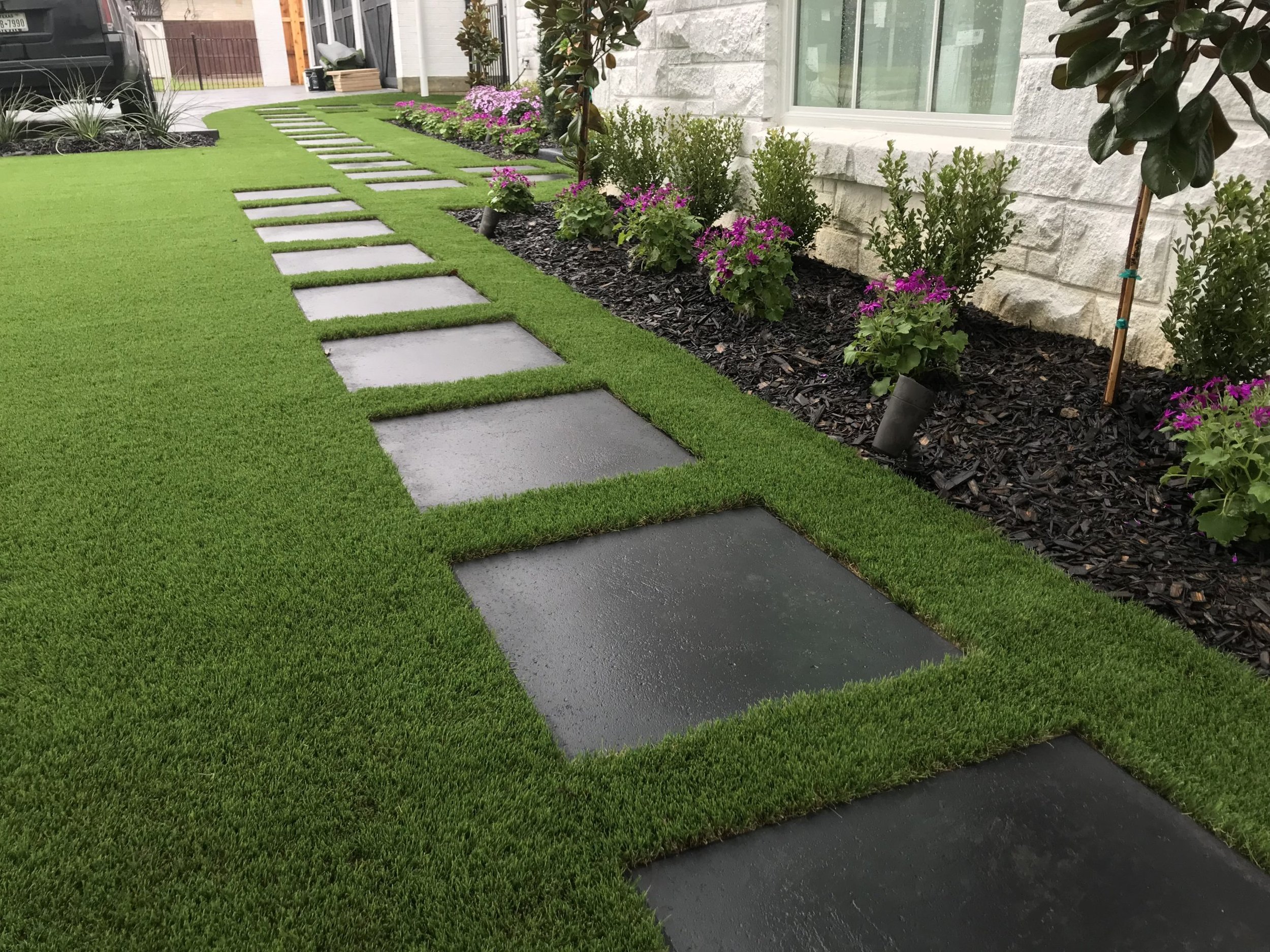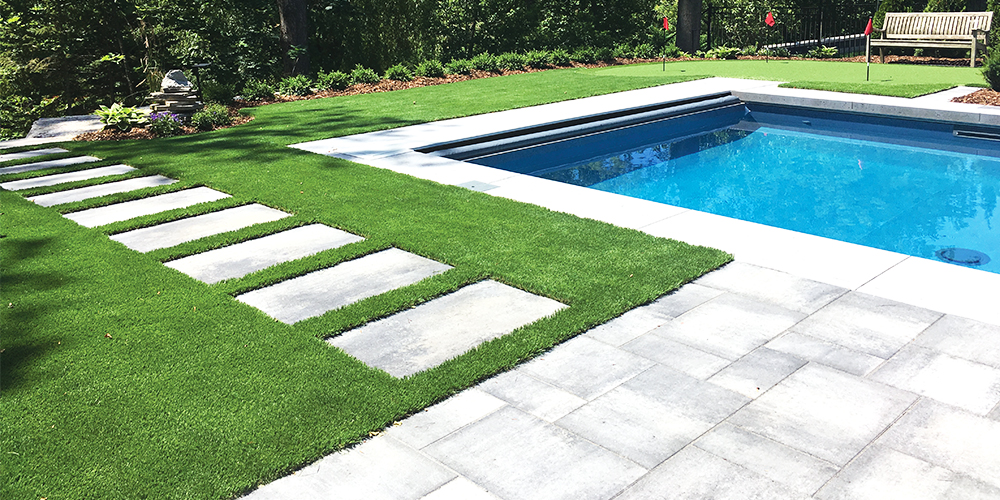Best Phoenix Turf Companies Specializing in Synthetic Grass Solutions
Best Phoenix Turf Companies Specializing in Synthetic Grass Solutions
Blog Article
Look Into the Environmental Perks of Opting for Artificial Turf Solutions
The fostering of fabricated turf services presents a compelling possibility to address pressing environmental challenges. By significantly decreasing water use and minimizing the application of dangerous chemicals, these options not only promote sustainable landscaping but additionally safeguard neighborhood ecosystems.
Water Conservation Conveniences
One of the most significant advantages of artificial lawn is its capacity to conserve water. In comparison, man-made turf does not require watering, significantly decreasing the total need for water resources.
By eliminating the need for routine watering, synthetic grass contributes to lasting landscape techniques and helps mitigate the environmental influence of excessive water usage. Additionally, the preservation of water prolongs to the decrease of runoff, which can result in dirt erosion and river pollution.
In addition, the setup of man-made turf permits property owners and towns to designate water sources more effectively, focusing on necessary uses such as drinking water and farming. The shift in the direction of fabricated lawn not only advertises accountable water use yet also lines up with broader ecological goals focused on preserving all-natural sources.
As neighborhoods significantly focus on sustainability, the water conservation advantages of synthetic grass offer an engaging situation for its fostering in industrial and household landscape design tasks.
Reduced Chemical Usage
The transition to synthetic grass dramatically reduces the dependence on chemical treatments commonly utilized in natural lawn upkeep. Traditional grass management normally entails the application of chemicals, plant foods, and herbicides to advertise growth and control parasites. These chemicals can present threats to human health and wellness, local wildlife, and the environment, contributing to soil and water contamination.
In contrast, synthetic grass gets rid of the requirement for these damaging materials. When mounted, it requires minimal upkeep, mainly containing routine cleansing and seldom infill replenishment. This reduction in chemical usage not only benefits the prompt atmosphere but likewise contributes to broader environmental security. By lessening the launch of artificial compounds right into the ecosystem, synthetic grass promotes much healthier soil and water systems.
Furthermore, the absence of chemical overflow connected with synthetic grass installations helps safeguard neighborhood rivers from air pollution, sustaining aquatic life and maintaining biodiversity. Arizona artificial turf. As neighborhoods progressively focus on sustainable practices, choosing for fabricated lawn offers a viable service that straightens with environmental conservation goals. Through this shift, residential property owners can enjoy rich eco-friendly areas without jeopardizing eco-friendly wellness, leading the means for a much more sustainable future
Lower Carbon Footprint

Furthermore, the installment of artificial lawn can result in substantial water preservation. All-natural lawns need substantial quantities of water for irrigation, which not only includes to the carbon footprint associated with water extraction and treatment yet also stress neighborhood water sources. In comparison, artificial turf needs very little upkeep, needing no watering, consequently dramatically lowering water usage and its associated power expenses.
Furthermore, the durability of fabricated lawn adds to its decreased carbon effect. With a life expectancy of approximately 15 years or even more, the requirement for regular use this link substitutes is reduced, leading to less waste and lower energy consumption in manufacturing and taking care of typical yard alternatives. Overall, synthetic grass offers a lasting option for environmentally aware landscape design.
Habitat Preservation
Habitat conservation is a critical factor to consider in the dispute over landscaping choices, particularly when contrasting synthetic grass to natural yard. All-natural lawn lawns frequently call for considerable maintenance, consisting of making use of chemicals, fertilizers, and herbicides, which can detrimentally affect regional communities. These chemicals can seep into the dirt and waterways, damaging indigenous flora and animals and disrupting neighborhood environments.
In contrast, synthetic grass offers a chance to lower the environmental impact of landscaping. By going with artificial turf, house owners can minimize the interruption of all-natural habitats connected with standard grass treatment practices. Synthetic grass removes the need for damaging chemicals, therefore securing neighboring wildlife and maintaining the honesty of surrounding ecological communities. Furthermore, the installment of synthetic grass can bring about the conversion of former turf locations into even more biodiverse landscapes, such as pollinator yards or native plant locations, which can support local wildlife.
Ultimately, the shift to synthetic grass not only conserves water and reduces maintenance efforts yet likewise fosters an extra unified partnership in between human activities and the natural surroundings, advertising habitat preservation in the process.
Long-Term Sustainability
Long-term sustainability is a crucial consider evaluating the benefits of man-made grass over traditional grass lawns. Among one of the most considerable benefits of synthetic grass is its resilience; it can last up to 15-20 years with marginal upkeep, whereas natural grass calls for constant reseeding and replacement. This long life minimizes the requirement for continuous sources, such as water, fertilizers, and chemicals, which are vital for maintaining a healthy and balanced turf yard.
Furthermore, synthetic grass contributes to a reduction in carbon exhausts related to grass care tools. Traditional yards frequently call for gas-powered mowers, leaners, and blowers, all of which add to air pollution. Arizona turf. On the other hand, synthetic grass eliminates the requirement for such tools, promoting a cleaner atmosphere
Additionally, the production of man-made turf progressively makes use of recycled materials, improving its sustainability profile. As makers take on green practices, the environmental my site footprint of synthetic grass proceeds to diminish.

Verdict
The adoption of synthetic grass services offers considerable environmental benefits, consisting of significant water conservation, lowered reliance on hazardous chemicals, and a reduced carbon footprint. Fabricated turf help in preserving natural environments by minimizing land disturbance and advertising long-term sustainability through the usage of resilient products. Jointly, these elements highlight the capacity of synthetic grass to add positively read here to environmental wellness and use a practical option to typical landscaping methods in a significantly resource-conscious world.
In contrast, man-made lawn does not need watering, substantially minimizing the overall demand for water resources. By lessening the launch of synthetic substances into the environment, fabricated lawn promotes healthier soil and water systems.
Moreover, the installment of fabricated turf can result in substantial water conservation. In contrast, man-made grass requires marginal upkeep, needing no watering, therefore dramatically reducing water usage and its associated power expenses.

Report this page